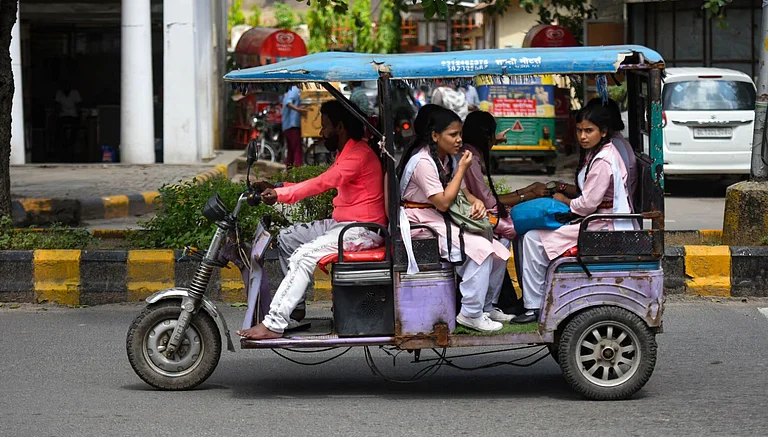The next time he appears, out of an unbuttoning trouser, he generates similar electricity. "' My God you arebig!' she exclaimed in alarm. 'This thing will tear me to pieces.'"
The next time around, he's in a flashback, dazzling the Americans. "' Goodness gracious me!' she chortled. 'Where on earth did you buy that one?'"
The audience never stops clapping at the hero's appearances. When he hoves into Yasmeen's view, "she gasped at what she saw. 'Mashallah! What have you got there?'" The young Punjabi virgin, Sonu, about to be attacked by him, knows the answer: "It's like an iron rod! A very big iron rod. If you thrust that in me it will kill me!"
His very sight drags out some kind of primal ethnicity from the awed onlooker. When Mary Joseph interfaces with him, she exclaims, "Aiy Aiy yo! Saar, you are very big. I like it very much." Goan Molly Gomes is a little more phlegmatic: "Man, I've never seen anything of this size before. And believe me I've seen quite a few." The Sri Lankan Susanthika's response is a trifle more erudite: "It feels like Ashoka's pillar entering me. I like it. Put in all you have." The whore in Bombay is not as easily impressed. On catching sight of him, she declares practically, "For that I should charge you double."
Make no mistake, the hero of The Company of Women is Mohan Kumar's gargantuanorgan. Each time he shows up the women explode in exclamation marks. This he does every thirty pages or so. For the rest he skulks in wait, trammelled in Mohan Kumar's trousers, giving us a chance to acquaint ourselves with Mohan Kumar's life. It is an ordinary life (rendered extraordinary only by the beast beneath his belly). Khushwant writes with a thick pen, granting Mohan a minimal inner life, and broadbrush sensibilities. Mohan has an export business, rides a Mercedes, lives in a two-storeyed house in posh Maharani Bagh, and daily smokes cheroots and drinks scotch. There are only a couple of complications in his life. One is his solitary relative, his father: he is summarily dis-patched, to death, midway through the book. The second is his marriage, to nagging Punjabi lass Sonu: she is summarily served a divorce, also midway through the book. Mohan is now free to co-habit peacefully with the leviathan in his trouser, and cater to such excesses as he may demand.
As it were, the excesses are hardly Henry Milleresque. Mohan's leviathan demands regular sex. No big deal. He demands vari-ety. No big deal. In fact he is positively moralistic, almost never two-timing. He practises serial adultery, eschewing the sweepress (yes, the oldest, saddest class fantasy) when he starts sleeping with Sarojini, the college lecturer. His equipment might have a prehistoricaura, but there's nothing primal about Mohan's lust. He fornicates with his women in the safe confines of safe bedrooms, and is the picture of consensual harmony, doing it only when everyone is in jolly agreement. (Even on his marriage night he retires quietly to his bed when his young bride asks for a few days of reprieve.)
Most of the time Mohan is a picture not of raging lust, but of tender care, providing his partners with money, boarding, car, and care. The sex is unoriginal. Straight, missionary, in-out, in-out. Only at the very end are we told that Mohan dislikes oral sex. An entire universe is thrown out of the window. No wonder, we gasp, it's all been so clinical and unerotic. Khushwant attempts to give his protagonist some philosophical range and depth by making him sleep with an entire slew of religions: Christian, Islamic, Hindu, Buddhist, Sikh. If there is any deep insight into the sexual potential of religions, he doesn't let on.
Of course, the book is bad. In literary terms, that is. It's shallow, callow, cliched, corny. But outside of that demanding frame of reference, it's a page-turning— though largely plotless— story of loneli-ness, and the sordid, in India at least, quest for sexual connec-tion. Mohan is an okay man, all he wants is regular uncomplicated sex, the love of women. For that he has to give up most of his life, his children included. At the end, in fact, the book isalmost sad. Just that the sadness lasts for only as long as it takes to refill your glass of scotch.
On the other hand, the book is a triumph. A reminder that in a country full of the hype of talented new writers, it still needs an 85-year-old sardar to look sex straight in the eye and tell it in all the four-letter words that are its visceral glory.


























